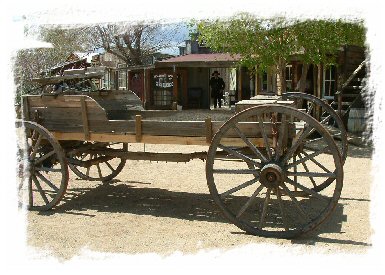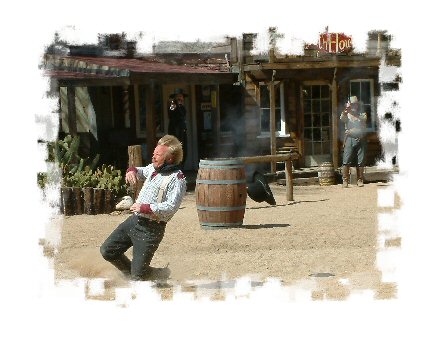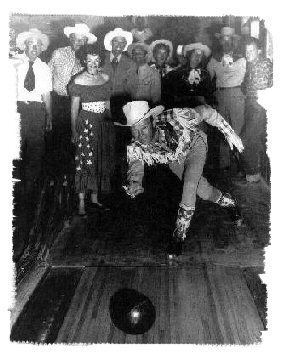 |
|||
 |
|||
 |
|||
 |
|||
 |
|||
 |
|||

by Chuck & Diane Brady
![]() n the high desert,
about 30 miles north of Palm Springs, California, is the hamlet of Pioneertown.
But its not just an ordinary small town. It was built in 1946 as a place to
shoot western movies, including the movies and television shows of Gene Autry
(America’s Favorite Singing Cowboy), Roy Rogers (King of the Cowboys),
the Cisco Kid, Annie Oakley, and many other staples of Saturday movie matinees
and early television.
n the high desert,
about 30 miles north of Palm Springs, California, is the hamlet of Pioneertown.
But its not just an ordinary small town. It was built in 1946 as a place to
shoot western movies, including the movies and television shows of Gene Autry
(America’s Favorite Singing Cowboy), Roy Rogers (King of the Cowboys),
the Cisco Kid, Annie Oakley, and many other staples of Saturday movie matinees
and early television.
Walking
down Mane St. (yep, that’s how it’s spelled) is reminiscent of the
old wild west …
Walking down Mane St. (yep, that’s how it’s spelled) is reminiscent
of the old wild west, and feels like walking on a western movie set, but the
buildings aren’t just flats. Most are houses, built to house the actors
and film crews, and are now private residences. There is even a sound stage
for filming interior scenes — it looks like an old barn.
The street was made extra wide, to accommodate camera dollies and the many
crew members needed to do the filming.
The town may be small, but it certainly isn’t sleepy. We recently spent
a Sunday there, staying at the Pioneertown Motel. The accommodations are pretty
basic, but this is the wild west, you know.
On Saturdays and Sundays from April through October there are gunfighter
shows at 2:30 on Mane St. If you are traveling with kids, they will love it.
The ‘gunfighters’ talk to the kids (and grown-ups) about the safe
handling of guns, and demonstrate the dangers of shooting blanks — they
are very dangerous at close range. In fact, in a recent episode of one of
the CSI television programs, a blank cartridge was used to commit a murder.
Pioneertown Motel: Built of railroad ties chinked
with mortar, the motel is really a long log cabin. The movie and TV stars
and crew stayed here while filming. There are 17 rooms, each with a different
western/movie motif. Gene Autry and others would gather in room nine to play
cards — it became known as Club Nine — and you can stay in it now.
The motel even has horse stalls, for those who arrive with horses.
Pioneer Bowl: Roy Rogers didn’t like to play
cards, but he did like to bowl. So he built a bowling alley. He rolled the
first ball, in cowboy boots (he owned the place, so he could do whatever he
wanted), and it is reported that it was a strike. It’s open Saturdays
and Sundays from April through October.
Pappy and Harriet’s Pioneertown Palace: A very
popular roadhouse-style restaurant and bar, with a dance floor, and live entertainment
Thursday through Sunday, mostly country and rockabilly. Usually pretty crowded,
and as with most current bands, very loud.
Red Dog Saloon: Currently undergoing restoration, with a hoped for re-opening later this year. It is being restored to the way it looked before a fire (of suspicious origin, because a nearby restaurant also burned two days later) destroyed it in 1966, and will feature live bands performing old country and western music. There will be lots of historical memorabilia, and movies filmed in Pioneertown will be shown.
Pioneertown Motel: tel. 888/365-4879; www.pioneertownmotel.com.
Pappy & Harriet’s: 760/365-5956; www.pappyandharriets.com.
Red Dog Saloon: 760/964-6549; www.thereddogsaloon.com.
Pioneertown: www.pioneertown.com.
Return to: Current articles, Top, Home.

Mane Street, Pioneertown
Chuck Brady photo
 The
marshall takes care of another bandit
The
marshall takes care of another bandit
Chuck Brady photo

Roy Rogers rolls first ball
Pioneertown photo
In July, a lightning sparked fire raged in this area for two weeks, and many buildings in the Pioneertown area were destroyed. The historic area, where these establishments are located was spared. Rebuilding has already begun, and on September 1, 2, and 3 the 60th anniversary of Pioneertown will be celebrated.